SERMONS IN CANDLES:
BYC. H. SPURGEON.
Lecture 2
Continued..............Part 3
 Here is a common lantern. The wind may blow, but the candle is safe within. The groom can cross the stable-yard in a shower of rain, or in a fall of snow, when his light is thus safeguarded. On board ship also, the lantern is of the utmost use; for even a gale of wind will not blow out the candle which is secure in a good lantern.
Here is a common lantern. The wind may blow, but the candle is safe within. The groom can cross the stable-yard in a shower of rain, or in a fall of snow, when his light is thus safeguarded. On board ship also, the lantern is of the utmost use; for even a gale of wind will not blow out the candle which is secure in a good lantern.Surely God will preserve his own Gospel, though Popes and monks, men of "modern thought", and theoretical scientists, blow at its candle with all the fury of fiends. Burn on, 0 sacred light, that by thee men may be guided to the haven of rest! Bright Pharos of the sea of time, thou Cross of Christ, cast thy splendour over stormy waves, and warn passing mariners to shun the iron-bound coasts of error!
The Providence of God is the great protector of our life and usefulness, and under the divine care we are perfectly safe from every danger.
Till He please I cannot die:
Not a single shaft can hit
Till the God of love thinks fit."
Yet we are apt to complain of the very providence which blesses us. Years ago a farmer returned from market with a golden burden, for he had sold his corn. He thought it hard that it should rain and spoil his best coat; but when he came to the lone place between the woods, and perceived that a highwayman would have shot him if the rain had not damped his powder, he had a much more vivid idea of the wisdom of God.
Remember Bernard Gilpin, the apostle of the North. He was seized and taken to London to be tried as a heretic. On the road he fell from his horse, and broke his leg. His persecutors knew that his wont was to say, "It is all for the best"; so they taunted him with the enquiry, "Is this all for the best?", and he meekly replied that he had no doubt it would turn out to be so. Gilpin was right. A delay was caused on the road, and he and his guard arrived in London just as Queen Mary died. They heard the bells ringing when they came to Highgate Hill, and learned that Queen Elizabeth was on the throne. He was too late to be burned: he had broken his leg, but he had escaped the flames. In some way or other the Lord will preserve his people from all evil, even as the lantern preserves the light which is placed within it.
There is a still more happy preservation. "Preserved in Christ Jesus." What a precious word! A feeble life is secure when hidden away in Christ. He it is that guards us safe from every ill design. Neither the world, the flesh, nor the devil can blow out the flame which he has kindled, for he surrounds it with his own almighty grace. Even to eternity our light shall shine if we by faith are put into Christ.
But there are imitations of this security: there are confidences which are vain. A man may be so far a Christian as to be safe against the courser vices; but yet the tempter may find out a place where he lies open to attack. My assistant will play the part of the tempter, and blow at this candle.
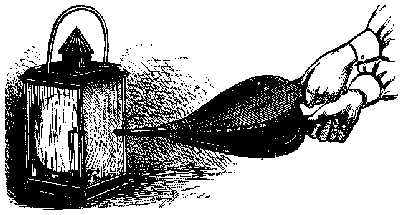 He has done no harm as yet, for the guardian lantern has covered the quarter upon which he has blown; but if he will try again, the result may be different. He may then hit upon the weak point. A man's religion may save him from certain sins, but not from others. He may not perish by drink, but he may be ruined by "covetousness, which is idolatry ": he may escape the pestilence of profanity, and be carried off by the fever of pride. In vain are we guarded in head and feet, if a poisoned arrow enters the breast. A candle in one of the old emblems is made to say, "I lie open only here"; but it is just there that the wind enters and blows it out. Where there is a weakness the archenemy will find it out and bring his force to bear; and as he is "the prince of the power of the air",
He has done no harm as yet, for the guardian lantern has covered the quarter upon which he has blown; but if he will try again, the result may be different. He may then hit upon the weak point. A man's religion may save him from certain sins, but not from others. He may not perish by drink, but he may be ruined by "covetousness, which is idolatry ": he may escape the pestilence of profanity, and be carried off by the fever of pride. In vain are we guarded in head and feet, if a poisoned arrow enters the breast. A candle in one of the old emblems is made to say, "I lie open only here"; but it is just there that the wind enters and blows it out. Where there is a weakness the archenemy will find it out and bring his force to bear; and as he is "the prince of the power of the air",
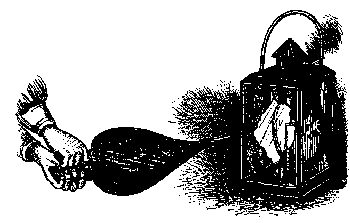 he can blow with a vengeance, and the man's candle is put out, because he had not found that perfect security which none but the Lord Jesus Christ can give. Beware of trusting to good resolutions or outward religiousness: these are cracked lanterns. No man is safe out of Christ: he alone is the perfect protection of his people. "Ye are complete in him"; but in no one else.
he can blow with a vengeance, and the man's candle is put out, because he had not found that perfect security which none but the Lord Jesus Christ can give. Beware of trusting to good resolutions or outward religiousness: these are cracked lanterns. No man is safe out of Christ: he alone is the perfect protection of his people. "Ye are complete in him"; but in no one else.
I do not know whether I can manage so to blow out this candle as to light it again by the help of its own smoke and this taper. Yes, I have managed it; and it is a pretty experiment. See, the flame travels down the smoke, and lights the wick again. When a man has been a real Christian, if his light seems blown out he readily takes fire again, if he has not been long in an ill condition. He who stays from the House of God can be easily brought back if looked after at once. He that has known how to pray is soon set praying again after an unhappy neglect, if he be taken soon.
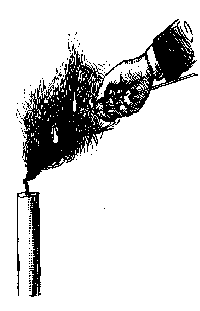 Never leave backsliders long; but with holy carefulness bring the holy fire to bear upon them as speedily as you can. The force of his former habit will aid you in restoring to the wanderer the religious feeling which had almost left him. The Lord Jesus is very tender in such cases; for "a smoking flax he will not quench." Let none of us be guilty of delays, lest the destruction of precious souls be laid at our door.
Never leave backsliders long; but with holy carefulness bring the holy fire to bear upon them as speedily as you can. The force of his former habit will aid you in restoring to the wanderer the religious feeling which had almost left him. The Lord Jesus is very tender in such cases; for "a smoking flax he will not quench." Let none of us be guilty of delays, lest the destruction of precious souls be laid at our door.
The same symbol will apply, on the other hand, to all forms of evil fire. It is no wonder that seeming converts so often and so speedily go back to old habits. You think their sin extinguished; but it is only the flame which is gone: the smoke of desire remains, and will soon catch fire again, and burn as strongly as before, if the flame of temptation is near. Oh, for grace to get that "fire of hell" snuffed out altogether! Let beginners in grace, in whom the flame of sin has been freshly blown out, beware of their old companions, and haunts, and habits; lest, going near the fire, their natural smoke of inclination should invite the flame of open transgression again to kindle upon them.
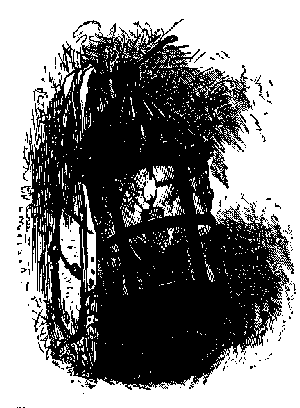 Here is a candle which is in a lantern of a tolerably respectable sort: at least, it was respectable long ago, and you might not now have noticed its forlorn condition if it had not been for the candle within. So soon as you place a light within, the imperfections of the lantern are shown up; and it is the same with human characters. Many a man would have seemed a decent sort of fellow if he had not professed to be a Christian; but his open confession of religion fixed many eyes upon him, and his imperfections were at once observed of all observers. He who unites with a church, and takes upon himself the name of Christ, claims a higher character than others; and if he is not true to his profession, his inconsistency is marked; and very justly so. How often do we see that an unconverted man may steal a horse, but a Christian must not look over the hedge at it! That which is winked at in a man of the world, is a grave fault in a Christian. It is no more than natural and just that great professors should be expected to be better than others. It is inevitable that the very light they have should reveal their faults and flaws.
Here is a candle which is in a lantern of a tolerably respectable sort: at least, it was respectable long ago, and you might not now have noticed its forlorn condition if it had not been for the candle within. So soon as you place a light within, the imperfections of the lantern are shown up; and it is the same with human characters. Many a man would have seemed a decent sort of fellow if he had not professed to be a Christian; but his open confession of religion fixed many eyes upon him, and his imperfections were at once observed of all observers. He who unites with a church, and takes upon himself the name of Christ, claims a higher character than others; and if he is not true to his profession, his inconsistency is marked; and very justly so. How often do we see that an unconverted man may steal a horse, but a Christian must not look over the hedge at it! That which is winked at in a man of the world, is a grave fault in a Christian. It is no more than natural and just that great professors should be expected to be better than others. It is inevitable that the very light they have should reveal their faults and flaws.
Brethren, let us not exhibit our candle in a dirty lantern, nor our religion in a doubtful character. I have heard of a minister who was a capital preacher, but he bought a wig of one of his hearers, and forgot to pay for it. A bad habit that! Not to pay at all, is worst of all; but even to be long-winded is objectionable. When the barber came home from the meeting he said, "That was a beautiful discourse; but his wig spoiled it. I like his deep expositions; but oh, that wig! Will he ever pay for that wig?" A friend who heard me tell this story remarked that "the wig stuck in the man's throat."
Let us pay for our wigs if we wear such inventions, and let. us see to it that there is nothing else about our person or character which may bring the gospel into discredit. We have heard of a wonderful preacher, of whom they said that he preached so well and lived so badly, that when he was in the pulpit, they thought he ought never to come out of it; but when he was out of the pulpit, they changed their minds, and sorrowfully concluded that he ought never to go into it again. Every man should be clean -- it is a natural, sanitary duty; but there is a special precept which says, "Be ye clean that bear the vessels of the Lord", and this relates to moral and spiritual character. An unholy minister is unclean with a vengeance. Prominent persons are looked at through microscopes. The more light you have, the more will your faults be shown up and observed.
In the case of this other lautern, little or no light would come from it, if it were not. for its cracks and rents. The light passes through the broken places. Do you not think that the sicknesses and infirmities of many godly people have been the making of them, and that the light divine has gleamed through the rifts in their tenements of clay? Do not light-givers sometimes shine the better for sickness? Some ministers preach the better for being afflicted.
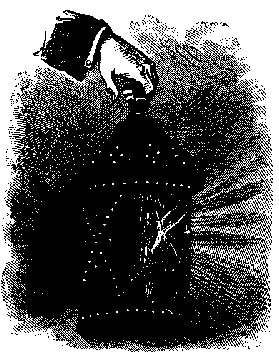 Do not wish your minister to be ill or to be tried; but I cannot doubt the fact that the trials of ministers are the best part of their education. One who was rather a critic in sermons used to ask, "Has the doctor been ill within the last six months? For he is not worth hearing else." An old Scotch woman found that when her minister lost his sight he could not read his dry old manuscripts, and was therefore forced to preach extemporaneously. Perhaps she was a little cruel when she said, "Praise be to God. It would have been well if he had lost his sight twenty years ago." To her mind the sermons were so much better when they came forth from his heart than when he read them from the sapless manuscript that to her the good man's loss of sight was a gain. If, in any way, you are able to tell out a sweeter experience, and so afford greater comfort to others through your body being like a broken lantern, be thankful for it. Happy are we if our losses are the gains of others. So long as our soul shines out with holier radiance, we will glory in infirmities.
Do not wish your minister to be ill or to be tried; but I cannot doubt the fact that the trials of ministers are the best part of their education. One who was rather a critic in sermons used to ask, "Has the doctor been ill within the last six months? For he is not worth hearing else." An old Scotch woman found that when her minister lost his sight he could not read his dry old manuscripts, and was therefore forced to preach extemporaneously. Perhaps she was a little cruel when she said, "Praise be to God. It would have been well if he had lost his sight twenty years ago." To her mind the sermons were so much better when they came forth from his heart than when he read them from the sapless manuscript that to her the good man's loss of sight was a gain. If, in any way, you are able to tell out a sweeter experience, and so afford greater comfort to others through your body being like a broken lantern, be thankful for it. Happy are we if our losses are the gains of others. So long as our soul shines out with holier radiance, we will glory in infirmities.
As adjuncts to a candle, we used to have tinder- box, flint, steel, and certain brimstone matches.
 I am almost afraid to employ these implements as illustrations, for they are almost as much out of date as the flint arrowheads of the prehistoric period. Few of you have ever struck a light with a flint in your lives, though I hope you will all strike a light in some better sense.
I am almost afraid to employ these implements as illustrations, for they are almost as much out of date as the flint arrowheads of the prehistoric period. Few of you have ever struck a light with a flint in your lives, though I hope you will all strike a light in some better sense.
Shall I instruct you in the practical science of getting a light with flint and steel? The first thing is to make your tinder, by burning or rather scorching a piece of rag. Toast it or char it till it is tenderly made into tinder. Neither do it too little, nor too much; cook your rags to a turn. Be very mindful to keep your tinder dry as a bone; for a spark will be of no service if it does not fall where it will be nourished; and the least damp will kill it. The sparks of temptation would be harmless if it were not for the tinder of corruption in our hearts. Good teaching is also lost unless it falls upon a mind prepared to receive it: so that the metaphor can be used either way.
Having secured your tinder, you had next to know how to strike your flint and steel so as to create sparks. Many a knock of the fingers would you get if you did not look alive. Possibly you would also bark your knuckles if you did know the art, if the weather was cold and your hands were half frozen. So is it in your dealing with men's consciences: you may give a hard knock and fetch fire out of them, or you may break your own knuckles by bringing upon yourself personal ill-will.
If yea were so skilful or so fortunate as to cause a spark to drop into the tinder, you had to blow upon it very gently; just as the first sign of grace in any heart needs encouraging with the fostering breath of sympathy. How often have I seen a servant go down on her knees to blow at a coal which seemed to have a little life in it! Let us do the like with those persons concerning whom we are somewhat hopeful.
When the spark had become fairly prosperous in the tinder, then you applied the point of your brimstone match. You do not quite know what I mean. Well, mind you do not make a brimstone match when you get married. The brimstone, at the sharpened point of the match, would take fire when it touched the spark, and then your labour approached its reward. When you had your match flaming, and smelling, you lighted your candle; and having done with your elaborate apparatus, you popped the flat lid of the box upon the tinder to put it all out. This last operation of damping down resembles the behaviour of critics towards young preachers and writers if they see a spark or two of fire in them. I know this illustration by heart, for I had the lid popped upon myself when I was a young spark. The work was not done very effectually; but this was not due to any want of fell intent on the part of my critics. I owe them much for which I feel no gratitude, because they meant me no good.
I found it very difficult to procure this ancient relic in London: indeed, I had to give up all idea of purchase, and this specimen was specially made to order. Be glad that now you have lucifers and vestas, to flame forth in an instant; for on a cold winter's morning it was tedious work to use this complicated instrumentality when it was in perfect condition, and many things might happen to make that condition imperfect, and render your labour fruitless. If you had the gout in your hand you could not strike the sparks; if the tinder was damp the sparks. could not live; and if there happened to be no tinder, because you forgot to make it; or, if the matches were missing, you were done for. Three cheers for the good old times of tinder boxes; may they never come back!
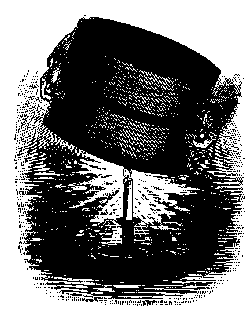 Let me set before you an admirable illustration, which is not one of my own, but comes from the great Master of assemblies. Here is a candle, and of course we have brought it with a view to its giving light, but the absurd action that I am bent upon is to cover it up with a bushel. It would be a very ridiculous thing to be at the pains of providing a lighted candle and then to hide it under a bushel. Yet I will do so to make the folly apparent to you all. I notice that you laugh; and well you may. You may use a bushel and use a candle; but by putting the candle under the bushel you use neither of them, but mis-use both. I am sure none of you would be guilty of such an absurd action. And can it be that even a single person here would be so profane as to believe that the All-wise God would do that which we all condemn as folly? And yet, when those of you who have grace in your hearts profess to believe that you are placed where you can do no good, you virtually charge the Lord with lighting a candle and putting it under a bushel. Yonder is my respected brother, a workingman. Hear what he has to say:-- "My dear Mr. Spurgeon, -- You cannot expect me to be doing any work in the church, for my daily labour leaves me no time for anything else. I could call the larks up in the morning; I am often abroad before the world is properly aired. Moreover, I have to work much too late to leave me a spare hour. I am willing, but quite unable to do a hand's turn for my Lord." Yes, yes; I see: you have to complain of a bushel which hides your light. God has lighted you, and then has put you where your light is condemned to be unseen. Do you quite believe that it is so? Have you no suspicion that, after all, you could shine, if you were exceedingly anxious to do so?
Let me set before you an admirable illustration, which is not one of my own, but comes from the great Master of assemblies. Here is a candle, and of course we have brought it with a view to its giving light, but the absurd action that I am bent upon is to cover it up with a bushel. It would be a very ridiculous thing to be at the pains of providing a lighted candle and then to hide it under a bushel. Yet I will do so to make the folly apparent to you all. I notice that you laugh; and well you may. You may use a bushel and use a candle; but by putting the candle under the bushel you use neither of them, but mis-use both. I am sure none of you would be guilty of such an absurd action. And can it be that even a single person here would be so profane as to believe that the All-wise God would do that which we all condemn as folly? And yet, when those of you who have grace in your hearts profess to believe that you are placed where you can do no good, you virtually charge the Lord with lighting a candle and putting it under a bushel. Yonder is my respected brother, a workingman. Hear what he has to say:-- "My dear Mr. Spurgeon, -- You cannot expect me to be doing any work in the church, for my daily labour leaves me no time for anything else. I could call the larks up in the morning; I am often abroad before the world is properly aired. Moreover, I have to work much too late to leave me a spare hour. I am willing, but quite unable to do a hand's turn for my Lord." Yes, yes; I see: you have to complain of a bushel which hides your light. God has lighted you, and then has put you where your light is condemned to be unseen. Do you quite believe that it is so? Have you no suspicion that, after all, you could shine, if you were exceedingly anxious to do so?
"There"! cries another, "I have little patience with a man who talks in that fashion; but as for me, I have hundreds of men to look after, and a great going concern, involving large capital, and this requires the whole of my energy both by day and by night. My cares are never over. Mine is brain- work of the most exhausting sort, and when I get away from the mill I feel no soul for reading, or prayer, or working in the cause of God. If it were hand labour, I should like the change to mental work; but I cannot keep on for ever tkinking, or I shall soon wear out my brain." Just so, my friend: God has given you the light of his grace, and has then deliberately placed a great golden bushel over the top of you! Do you feel sure that it is so? Is there not a still small voice, which whispers that there is something wrong?
But my friend Mrs. Fruitful, over yonder, says: "I quite agree with you, sir. These people are not tied to their homes as I am, for I have eleven children; and what can I do? I have a great deal more to do than you men dream of; and it is no fiction that a mother's work is never ended. If anyone can plead a good excuse from the Lord's work, I am sure I can." Good sister, I sympathize with you, far more than with those who have already spoken. You have your share of life's burden in your large little family. It is true, eleven is better than so very many; but I have no doubt they are a handful, a lapful, and a heartful. Yet, surely, it cannot be quite true that you are altogether denied the pleasure of shining for your Lord; else it would seem as if he had kindled you as his own candle, and then had put you under the bushel of a large family, to prevent your shining.
Yet there is the candle, and there is the bushel. We cannot imagine that the bushel is to be on the top of the candle. 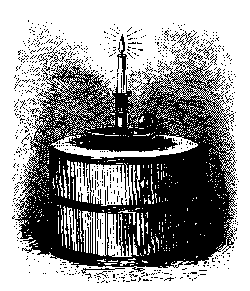 Still, they must be in some relation to each other. If we must not put the candle under the bushel, would it be amiss to put the bushel under the candle? See how well it looks! It is an admirable ideal Let. us carry out its principle! Cannot the working-man talk to his mates, and be a witness for Jesus in the shop? Parsons are all very well but holy artisans can carry the truth where we have no entrance! Cannot the great manufacturer see to the interests of those whom he employs, and treat them, not as "hands ", but as souls? Might he not do a world of good among his mill people if he had but a mind? I think so. And you, good mother of those dozen children save one, surely you have a work ready to hand in your own house. What a splendid Sunday school you have at home! Your children could not have a better teacher; and, from what little I know of them, I should say that you could not have much finer children to instruct. You will not be forced to walk weary miles to get to your class, nor will you be tempted to neglect your house: you can stay at home and train for God valuable church-members, fine workers among the poor, and soul-winning missionaries for the home and foreign field. What nobler work can there be than that of a mother among her own little ones? See how, by being set upon the bushel, the candle stands in a place of vantage, and obtains a worthy pedestal from which to spread its light far and wide! Wisely used, that which would hinder the idle will assist the diligent. This is one of the feats of faith, to turn difficulties into helps, to slay the lion and find honey in his carcase, and thus, on stepping-stones of growing victory, rise to complete triumphs.
Still, they must be in some relation to each other. If we must not put the candle under the bushel, would it be amiss to put the bushel under the candle? See how well it looks! It is an admirable ideal Let. us carry out its principle! Cannot the working-man talk to his mates, and be a witness for Jesus in the shop? Parsons are all very well but holy artisans can carry the truth where we have no entrance! Cannot the great manufacturer see to the interests of those whom he employs, and treat them, not as "hands ", but as souls? Might he not do a world of good among his mill people if he had but a mind? I think so. And you, good mother of those dozen children save one, surely you have a work ready to hand in your own house. What a splendid Sunday school you have at home! Your children could not have a better teacher; and, from what little I know of them, I should say that you could not have much finer children to instruct. You will not be forced to walk weary miles to get to your class, nor will you be tempted to neglect your house: you can stay at home and train for God valuable church-members, fine workers among the poor, and soul-winning missionaries for the home and foreign field. What nobler work can there be than that of a mother among her own little ones? See how, by being set upon the bushel, the candle stands in a place of vantage, and obtains a worthy pedestal from which to spread its light far and wide! Wisely used, that which would hinder the idle will assist the diligent. This is one of the feats of faith, to turn difficulties into helps, to slay the lion and find honey in his carcase, and thus, on stepping-stones of growing victory, rise to complete triumphs.
If there be real light in a man, you cannot. keep him under a bushel. You may try to repress a man of talent, but he finds his level in due time. You may endearour to destroy real grace when you meet with it among men; but neither you nor the devil will succeed. If you manage to place the gracious soul under a sort of bushel, something will happen for which you were not looking. If there is the real life of God within the person who is despised and covered up, the flame will find out a way for the revelation of the light. Grace may be oppressed; but it cannot be suppressed. In fact, it may be said of persecuted believers as of Israel in Egypt, "The more they afflicted them, the more they multiplied and grew."
 See the covered candle burns the bushel. No, it is not a bushel! It turns out to be a mere band-box. The light must, and will, burn its own way, and do its own work. That which is in a man will sooner or later come out. The genius that is in the man, and still more the spiritual life that is in him, will shine forth to the praise and glory of God; and there is no stopping it. I have heard of a gentleman who said he had learned to conceal his religion; and he believed that you might live in his house for a twelvemonth and never discover what his religion was. This he boasted of till one told him that he had lived two years in a man's house, and had never seen the colour of his money, for he was too poor to have any.
See the covered candle burns the bushel. No, it is not a bushel! It turns out to be a mere band-box. The light must, and will, burn its own way, and do its own work. That which is in a man will sooner or later come out. The genius that is in the man, and still more the spiritual life that is in him, will shine forth to the praise and glory of God; and there is no stopping it. I have heard of a gentleman who said he had learned to conceal his religion; and he believed that you might live in his house for a twelvemonth and never discover what his religion was. This he boasted of till one told him that he had lived two years in a man's house, and had never seen the colour of his money, for he was too poor to have any.
 This is not technically called a candle, but in effect it is one. A night-light is a delightful invention for the sick. It has supplanted the rushlight, which would frequently be set in a huge sort of tower, which, to me, as a sick child at night, used to suggest dreadful things. With its light shining through the round holes at the side, like so many ghostly eyes, it looked at me staringly; and with its round ring on the ceiling, it made me think of Nebuchadnezzar's burning fiery furnace. The night-light is so mild and quiet that it suits our weakness, and yet cheers our gloom. Blessed be the Child who first thought of it! Does it not remind you of a good, tender nurse? I always say -- as a fine specimen of what I mean -- my wife. She tells me that I cannot say this of her now, as she is so great an invalid; but I can speak of what she has been, and would be now if strength sufficed. She has been far more than a night-light to me in hours of pain. She moves across the room like the ancient deities, who were said to float rather than to walk. What gentle grace and tenderness! What unwearied watchfulness all through the night!
This is not technically called a candle, but in effect it is one. A night-light is a delightful invention for the sick. It has supplanted the rushlight, which would frequently be set in a huge sort of tower, which, to me, as a sick child at night, used to suggest dreadful things. With its light shining through the round holes at the side, like so many ghostly eyes, it looked at me staringly; and with its round ring on the ceiling, it made me think of Nebuchadnezzar's burning fiery furnace. The night-light is so mild and quiet that it suits our weakness, and yet cheers our gloom. Blessed be the Child who first thought of it! Does it not remind you of a good, tender nurse? I always say -- as a fine specimen of what I mean -- my wife. She tells me that I cannot say this of her now, as she is so great an invalid; but I can speak of what she has been, and would be now if strength sufficed. She has been far more than a night-light to me in hours of pain. She moves across the room like the ancient deities, who were said to float rather than to walk. What gentle grace and tenderness! What unwearied watchfulness all through the night!